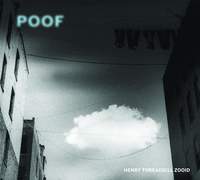Recording of the Week,
Henry Threadgill Zooid, 'Poof'

Composer, theorist, saxophonist and flautist Henry Threadgill’s music has existed in its own singular bubble since he first emerged in the late sixties, part of the explosion of creativity that was Chicago’s music scene. Along with contemporaries like Anthony Braxton, Lester Bowie, and Malachi Favors, all of whom were members of Muhal Richard Abrams’s AACM (Association for the Advancement of Creative Musicians), the Chicago musicians had a different approach to free jazz compared to the New York scene; less indebted to the developments of bebop and hard bop, it was more politicised, and often incorporated native African instruments and percussion. In 1971 Threadgill formed the trio Air with fellow AACM members, bassist Fred Hopkins, and drummer Steve McCall, who cooked up their own brew of free jazz that didn’t fit into any neat categories, partly due to the unusual sonorities Threadgill created on his homemade percussion instrument, the Hubkaphone. Moving to New York later in the decade Threadgill developed his taste for weird textures by forming X-75, a nonet for four reeds, four bassists and vocalist, and then the Henry Threadgill Sextett (yes, with two t’s) through the ‘80s, the Very Very Circus in the ‘90s and, since the turn of the century, Zooid, his longest lasting group.
There’s a consistently “Threadgillian” sound that runs through all of these projects, and not just because of his quasi neo-baroque alto saxophone tone or quixotic flute playing. Many of Threadgill’s projects forgo acoustic bass in favour of tuba or cello, giving some of his music a New Orleans marching-band aura, which contrasts well with the presence of the electric guitars that bring a touch of lightness. Although the foundation of Threadgill’s music can heavily theoretical, influenced by ideas from biology (in case you didn’t know, a ‘Zooid’ is “an animal arising from another by budding or division, especially each of the individuals which make up a colonial organism and typically have different forms and functions”), mathematics, and serial composition, it doesn’t require a manual to navigate through his music (unlike, for example, some of Anthony Braxton’s more outre conceptual works). There’s always a tension between the notated and the improvised which keeps the music flowing in unexpected ways, and this is very much in evidence on Poof.

Opening track ‘Come and Go’ is an ideal taster into the pointlistic textures typical of Zooid. Drummer Elliot Humberto Kavee manages to keep the rhythms swinging yet unpredictable, playing in and out of the pulse without losing momentum, and whilst Jose Davila’s tuba does fulfill the bass players role to a certain extent, he’s not restricted to keeping time, and often supports the fractured melodies being spun by Threadgill, guitarist Liberty Ellman and cellist Christopher Hoffman. Threadgill’s sparing, somewhat acerbic alto sound has a very specific timbre and attack which isn’t to all tastes (let’s just say that I’ve been listening to this through headphones not by choice), but is an integral part of transforming whatever intervallic string-theory he’s applied to the thematic material almost into actual tunes. ‘Happenstance’ showcases Threadgill’s comparatively more sensual way with the flute, an even sparser, chamber-like composition, with some gorgeous interjections towards the back end from Ellman’s acoustic guitar. Davila switches to trombone for ‘Beneath the Bottom’, the first half of which gives him plenty of solo space for a dialogue with himself, before the band start to sneak up on him, leading to a loping waltz in the final minutes. British readers of a certain age might hear a passing similarity between the title track and the theme tune to the 1950s radio comedy ‘Hancock’s Half Hour’ (or the power of auto-suggestion will now), in the manner in which Davila’s fruity tuba lumbers between the others.
At 38 minutes the album never outstays its welcome, and because there’s plenty of space and silence between the players, the listener can actively choose which line to focus the attention on each time, meaning the pieces keep their freshness over repeat listens. Zooid’s music exists in its own strange universe - nothing sounds remotely like it - and is well worth exploring for those with the patience to sit back and observe how each composition germinates and eventually flowers.



